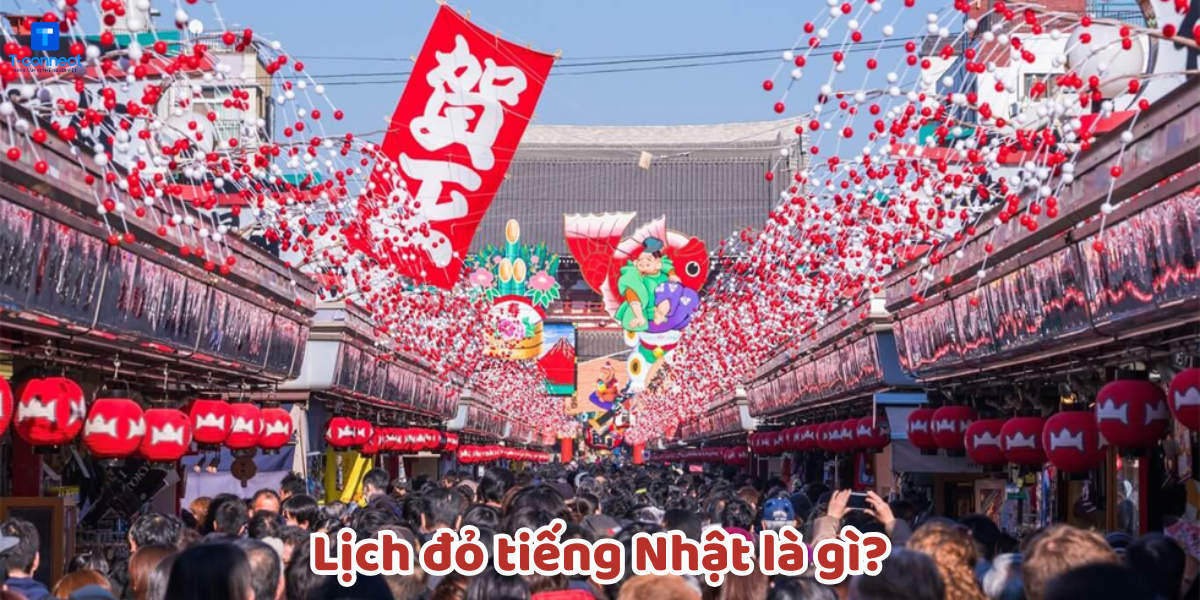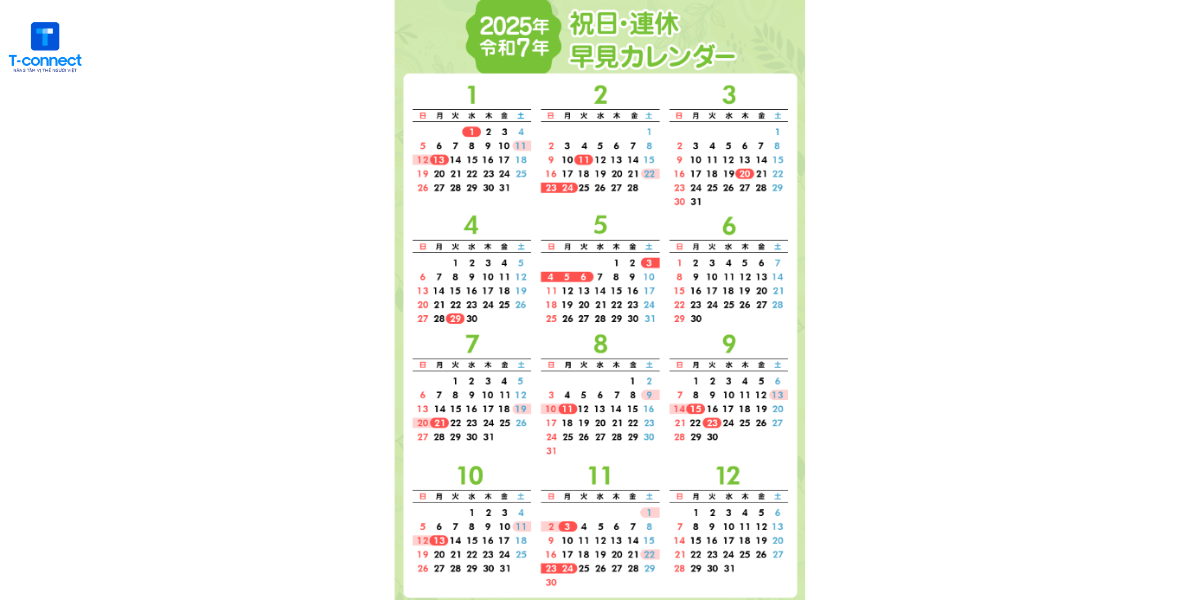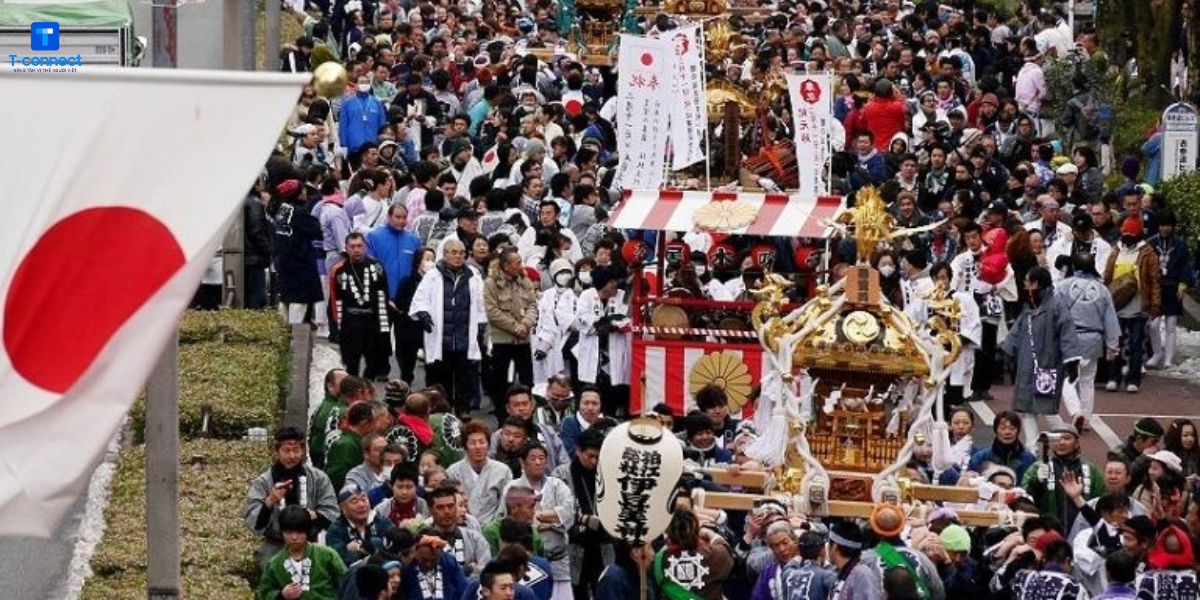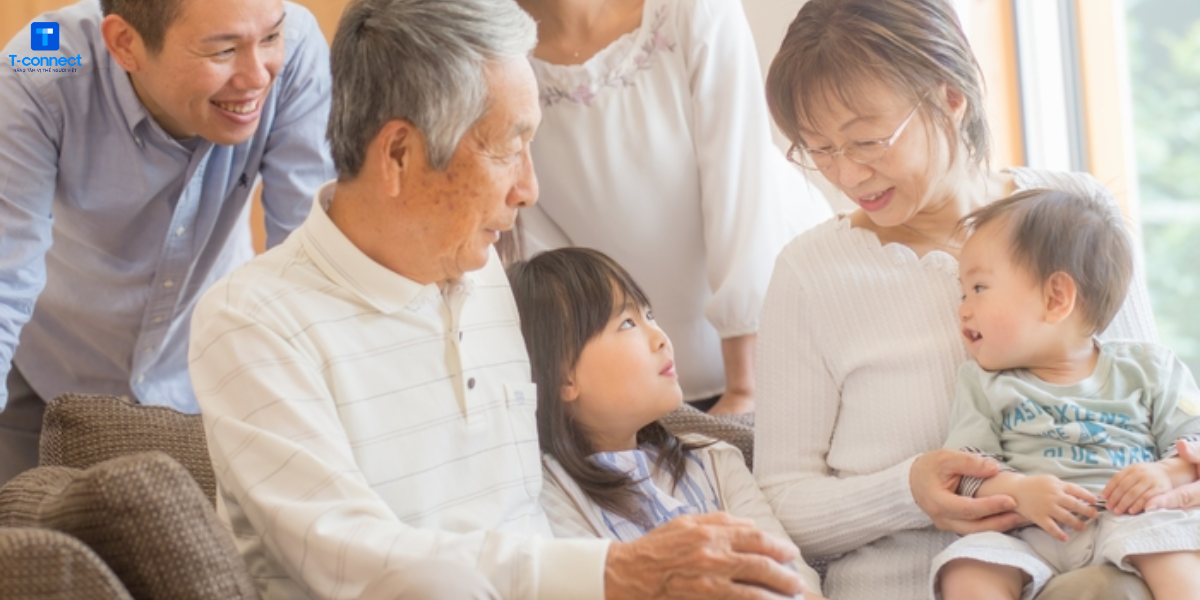If you are living, working or planning to travel to Japan, then you definitely cannot miss this. concept of "red calendar" – a familiar term in Japanese life. So what is the Japanese red calendar? Let's explore with T-Connect the profound meaning of the red calendar, as well as 6 typical holidays that anyone living, working or traveling in Japan should remember!

What is red calendar in Japanese?
“What is the Japanese Red Calendar?” is a very common question for Vietnamese people living and traveling in Japan. In Japanese, these days are called 祝日 (Shukujitsu) – meaning “holiday” or “congratulation day”. During these days, people usually have days off from work, students have days off from school, and many public agencies and services are also temporarily closed.
So why is it called “red calendar”? Because, similar to the way it is called in Vietnam, these holidays are marked in red on the calendar, so that people can easily distinguish them from normal working days. This is not only a time to rest but also an opportunity for Japanese people to show solidarity, respect for tradition and gratitude for social values.
Red calendar days in Japan in 2025 include:
| Holiday name | Day |
| New Year's Day | 1/1 |
| Coming of Age Day | 13/1 |
| Japan National Day | 11/2 |
| Emperor's Birthday | 23/2 |
| Compensatory day off | 24/2 |
| Vernal Equinox | 20/3 |
| Showa Day | 29/4 |
| Constitution Day | 3/5 |
| Green Day | 4/5 |
| Children's Day | 5/5 |
| Compensatory day off | 6/5 |
| Sea Day | 21/7 |
| Mountain Day | 11/8 |
| Respect for Elders Day | 15/9 |
| Autumnal Equinox | 23/9 |
| Sports Day | 13/10 |
| Cultural Day | 3/11 |
| Labor Day | 23/11 |
| Compensatory day off | 24/11 |

6 important “red calendar” days of the year in Japan
Japan has nearly 20 national holidays each year, which are regulated by law, but some of them have special meanings, closely linked to tradition, national spirit and the daily life of the people. Let's take a look at the 6 most important "red calendar" days that are especially respected by the people in Japan:
New Year's Day – New Year's Day (Ganjitsu)
- Time: July 1
- Typical activities: Offices and schools are usually closed for 1–3 days at the beginning of the year. Japanese people will reunite with their families and celebrate with food. osechi ryōri, send new year greetings (nengajo), and go to the temple at the beginning of the year (hatsumōde) to pray for luck and peace.
This is the most important holiday of the year for Japanese people, marking the beginning of the new year according to the Gregorian calendar. If you live in Japan, on this holiday, take the opportunity to send New Year greetings “Akemashite omedetō gozaimasu” to friends and colleagues – this is an indispensable ritual in Japanese New Year culture.
Coming of Age Day– Coming of Age Day (Seijin no Hi)
- Time: Second Monday of January
- Typical activities: Localities organize coming of age ceremonies (seijin-shiki), where young people dress in traditional attire (men wear hakama, women wear furisode) and are encouraged to contribute to society. It is also an occasion to remind young people of their civic responsibilities.
Coming of Age Day is a holiday to honor young Japanese people who have reached the age of 20 – the legal age of adulthood in society. In other words, this is an important holiday that marks a turning point in the life of every Japanese person, from a person under legal protection to an adult citizen with full rights and obligations.
National Day – 建国記念の日 (Kenkoku Kinen no Hi)
- Time: July 11
- Typical activities: Many places hold celebrations, hang Japanese flags and perform traditional music. This is an opportunity to express national pride and gratitude to ancestors.
Unlike many other countries, Japan's National Day has a legendary color. This day commemorates the coronation of Emperor Jimmu - the first emperor of Japan - in 660 BC, considered the origin of modern Japan.

Labor Day – 勤労感謝の日 (Kinro Kansha no Hi)
- Time: July 23
- Typical activities: Children write thank you cards to their parents, and companies organize internal activities to honor employees. This is also an opportunity to rest and reflect on the contributions of each individual in the hustle and bustle of work.
This day has its origins in the traditional harvest festival (Niiname-sai) of the Japanese royal family, has now become a day to honor workers and recognize the value of labor in modern society. Children often write thank you cards to their parents, and businesses have small commemorative activities.
Respect for the Elderly Day – 敬老の日 (The Legend of Keiro)
- Time: Second Monday of January
- Typical activities: Families gather, children visit and give gifts to grandparents and parents. Some localities hold ceremonies to honor the elderly who have lived long and made positive contributions to the community.
With the tradition of “respecting the elderly and wishing them a long life”, the Japanese set aside a holiday each year to show their gratitude to the elderly. This is also an ideal opportunity for us to learn about the healthy lifestyle, discipline and positive attitude that have helped the Japanese become famous for having the highest average life expectancy in the world.

Culture Day – Culture Day (Bunka no Hi) | 3/11
- Time: July 3
- Typical activities: Museums are free, schools organize cultural exhibitions, calligraphy performances, music, martial arts.
Culture Day is a day to honor the cultural, artistic, academic achievements and the spirit of freedom and creativity of the Japanese people. In addition, on this day, the Japanese government also awards the Order of Cultural Merit (文化勲章 – Bunka Kunsho) for individuals who have made great contributions to the cultural field - this is one of the most prestigious awards in the country.
Notes when living and working in Japan during the "red calendar"
When living and working in Japan on the days "red calendar", you need to keep in mind the following important points to ensure everything goes smoothly and without any difficulties:
- Public transport can be crowded.c: During national holidays, the number of people traveling in big cities like Tokyo and Osaka increases. If you plan to travel during these days, be prepared for traffic to be slow and heavy, especially during rush hours.
- Government offices and banks closed: Most government offices, banks, and post offices are closed on public holidays. If you need to take care of administrative, financial, or mail work, be sure to complete it well in advance of the holiday. Additionally, public services may operate on reduced or modified hours.
- Stores and services remain open, but hours may change: Many convenience stores, supermarkets or restaurants remain open during the holidays, but some stores or small businesses may reduce their hours of operation or close on certain days. Especially on major holidays such as New Year's Day, many restaurants and stores may close completely.
- Special cultural events and activities: During the holidays, there are many cultural events, exhibitions, and community activities, such as fireworks festivals, cultural competitions, and sports activities. This is a great opportunity for you to immerse yourself in Japanese culture and discover the beauty of tradition.
- Notes when traveling on red calendar days: Popular tourist destinations such as Kyoto, Tokyo, Hokkaido can be very crowded during national holidays, especially during Golden Week. If you are planning to visit, make sure you book your tickets and accommodation in advance, as prices can increase and accommodation often fills up quickly.
- Respect Japanese culture and etiquette: On important holidays such as Respect for the Aged Day or National Independence Day, Japanese people attach great importance to traditional etiquette and celebrate cultural values. If you participate in festivals, please show respect for etiquette and do not disrupt cultural activities.
Japan is a country with a rich culture and special holidays, where each “red calendar” has a deep meaning, expressing the spirit of respect for tradition and community. Hopefully, through the above article, T-Connect has answered the question “What is the Japanese Red Calendar” and helped you better understand this day in Japanese culture. Remember and plan early to have the best experiences during these important holidays!
If you are living in Japan and need a reliable telecommunication service, T-connect is the ideal choice for you! Our 100% Vietnamese team is always ready to support and bring attractive promotions, including free shipping nationwide.
T-connect offers a variety of flexible mobile and internet packages, making it easy for you to stay in touch with family and friends back home. We are committed to providing professional and dedicated service, making you feel close and comfortable, no matter how far away. Come to T-connect to experience meaningful connections in your life!

T-CONNECT CUP 2025 FOOTBALL TOURNAMENT REGULATIONS – CELEBRATION OF T-CONNECT'S 6TH ANNIVERSARY
The T-connect Cup 2025 football tournament is one of the sporting events [...]
Should I stay in Japan or return to Vietnam? 5 perspectives to help you make the right choice
After many years of studying and working in Japan, many people [...]
Which apps should Vietnamese people in Japan download? 15 essential apps when in Japan
Living, studying or working in Japan always comes with many [...]
5 tips to ship goods from Vietnam to Japan cheaply and safely
The demand for shipping goods from Vietnam to Japan is increasing, especially [...]
What do you need to prepare when converting your Japanese driver's license to Vietnam's? 7 important documents
While living and studying in Japan, many Vietnamese people have [...]
How does Japan handle waste? 5 waste treatment technologies in Japan that surprise the world
Japan is known as a country with a waste management system [...]
Instructions from AZ on how to register for UFJ online, latest 2025
In the context of increasingly busy life, having to go directly to [...]
How much does it cost to study graduate school in Japan? Detailed costs for Vietnamese international students
In recent years, Japan has increasingly become a top choice [...]